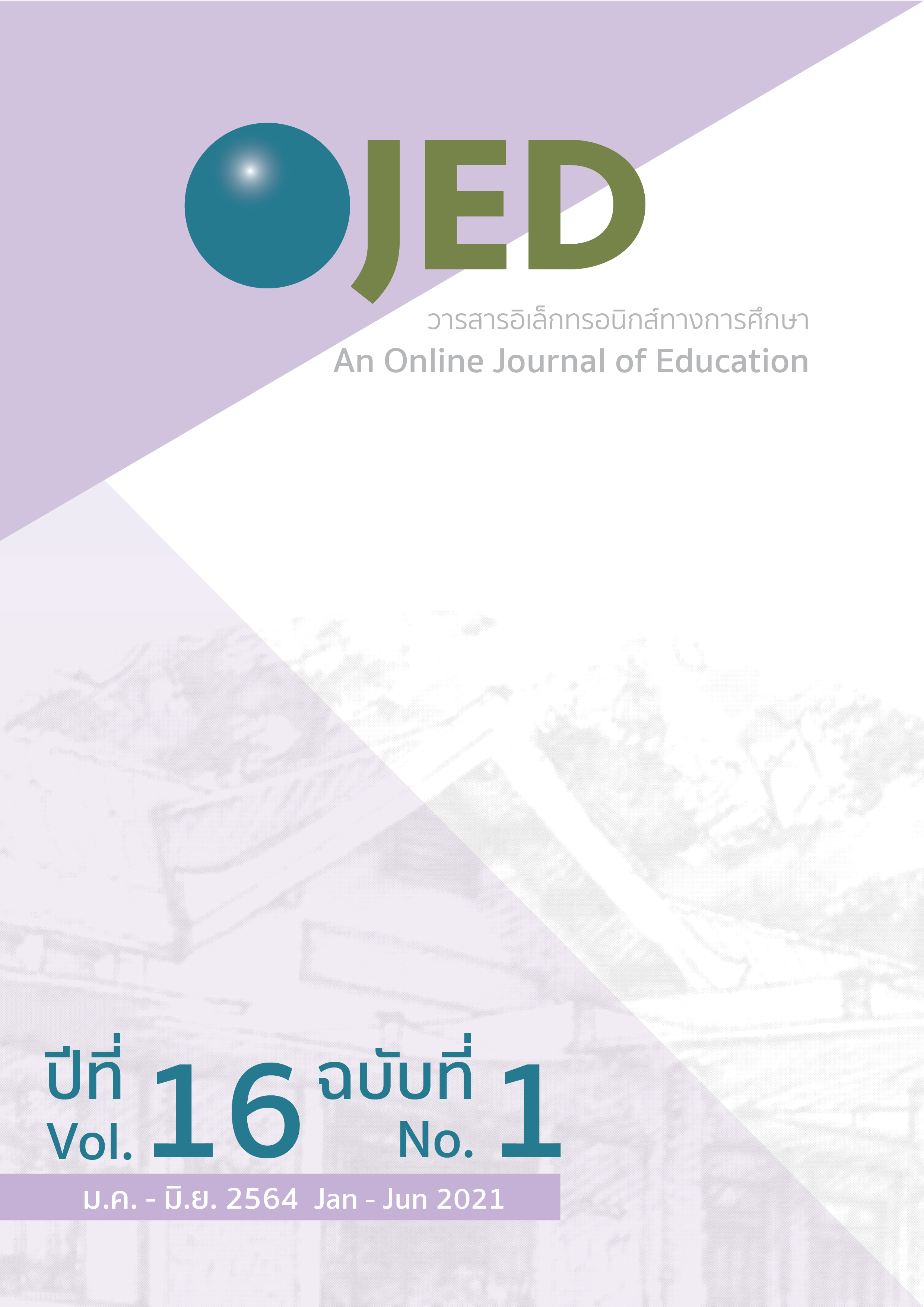The Development of a Cloud Based Training Model with Case-Based Learning To Enhance Media Literacy of Public Relation Officers in Non-Profit Organization
DOI:
https://doi.org/10.14456/ojed.2021.4Keywords:
media literacy, cloud based training, case-based learningAbstract
The purpose of this research study was to design and develop a Cloud-based training model with case-based learning to enhance the media literacy of public relations officers in non-profit organizations. This was a preliminary research study conducted with experts using results to develop a model, and the sample consisted of seven experts and five advisors. The research instruments were expert interviews and model evaluation forms. The result of the study concluded that the model consisted of five elements, namely: 1) Training objectives; 2) Participants and trainers; 3) Information and communication technology on the Cloud; 4) Case-based learning process; and 5) Evaluation. The training activities can be divided into the three phases, as follows: Phase 1: Pre-training, including 1.1) Orientation of trainees, and 1.2) Measurement of media literacy before training. Phase 2: Training, including 2.1) Instructor presents a case study; 2.2) Trainees examine the case study; 2.3) Trainees discuss questions to seek answers; 2.4) Instructor and trainees discuss problems to find common answers; and 2.5) Instructor assigns trainees work. Phase 3: Training follow-up, including 3.1) Summarize and evaluate the trainees’ learning outcomes; and 3.2) Measure media literacy after training. The result of the evaluation revealed the highest level (M = 4.65, SD = 0.49).
References
กวิสรา ทองดี. (2558). การพัฒนาระดับการรู้เท่าทันสื่อโดยใช้ชุดฝึกอบรมแบบผสานความจริงเรื่อง การรู้เท่าทันสื่อโฆษณาสำหรับเด็กและเยาวชน [วิทยานิพนธ์ปริญญามหาบัณฑิต]. มหาวิทยาลัยเทคโนโลยีพระจอมเกล้าธนบุรี.
กุลชัย กุลตวนิช. (2557). ระบบการเรียนบนห้องเรียนเสมือนแบบคลาวด์ตามแนวคิดการเรียนรู้คอนเน็คติวิสม์เพื่อส่งเสริมการรู้สารสนเทศและการรับรู้ความสามารถของตนเองด้านการรู้สารสนเทศสำหรับนิสิตนักศึกษาปริญญาตรี [วิทยานิพนธ์ปริญญาดุษฎีบัณฑิต]. จุฬาลงกรณ์มหาวิทยาลัย.
ชูชัย สมิทธิไกร. (2554). การฝึกอบรมบุคลากรในองค์การ Personel training in organizations (พิมพ์ครั้งที่ 7). สำนักพิมพ์แห่งจุฬาลงกรณ์มหาวิทยาลัย.
ทิศนา แขมมณี. (2557). ศาสตร์การสอน : องค์ความรู้เพื่อการจัดกระบวนการเรียนรู้ที่มีประสิทธิภาพ (พิมพ์ครั้งที่ 18). สำนักพิมพ์แห่งจุฬาลงกรณ์มหาวิทยาลัย.
นิธิดา วิวัฒน์พาณิชย์. (2558). การพัฒนาทักษะการรู้เท่าทันสื่อสังคมออนไลน์. วารสารบัณฑิตศึกษา มหาวิทยาลัยราชภัฏวไลยอลงกรณ์, 9(3), 209–219.
บุบผา เมฆศรีทองคำ และ ดนุลดา จามจุรี. (2554). การศึกษาการรู้เท่าทันสื่อ: วิถีทางในการสร้างพลังการรู้เท่าทันสื่อ. วารสารนักบริหาร, 31(2), 63-69.
ปกรณ์ ประจัญบาน และ อนุชา กอนพ่วง. (2558). การวิจัยและพัฒนาแบบวัดทักษะในศตวรรษที่ 21 ด้านการรู้เท่าทันสื่อ ของนักเรียนชั้นมัธยมศึกษา. วารสารศึกษาศาสตร์ มหาวิทยาลัยนเรศวร, 18(1), 144-154.
ปทิตตา รอดประพันธ์. (2559). การพัฒนาหลักสูตรเยาวชนรู้เท่าทันสื่อตามแนวคิดการเรียนรู้แบบมีส่วนร่วมสำหรับนักเรียนชั้นมัธยมศึกษาตอนต้น. วารสารศึกษาศาสตร์ มหาวิทยาลัยนเรศวร, 18(4), 156-170.
เพ็ญจันทร์ สังข์แก้ว. (2544). การบริหารการฝึกอบรม. ริมปิงการพิมพ์
มารศรี จันทร์ดี. (2557). ผลของการจัดการเรียนการสอนโดยใช้กรณีศึกษาต่อความสามารถในการใช้กระบวนการพยาบาลของ นักศึกษาพยาบาล รายวิชาปฏิบัติการพยาบาลบุคคลที่มีปัญหาสุขภาพ 1. วารสารการพยาบาลและการศึกษา, 7(4), 134-155.
วรุตม์ อินทฤทธิ์. (2558). ผลของการเรียนการสอนสังคมศึกษาโดยใช้วิธีกรณีศึกษาที่มีต่อมโนทัศน์ประชาธิปไตยและความสามารถในการคิดอย่างมีวิจารณญาณของนักเรียนมัธยมศึกษาตอนปลาย [วิทยานิพนธ์ปริญญามหาบัณฑิต]. จุฬาลงกรณ์มหาวิทยาลัย.
วิจิตร อาวะกุล. (2540). การฝึกอบรม (พิมพ์ครั้งที่ 2). ศูนย์หนังสือจุฬาลงกรณ์มหาวิทยาลัย.
สำนักงานคณะกรรมการกิจการกระจายเสียงกิจการโทรทัศน์และกิจการโทรคมนาคมแห่งชาติ. (2556). รู้เท่าทันสื่อ. http://bcp.nbtc.go.th/knowledge/detail/306
อุษา บิ้กกิ้นส์. (2555). การรู้เท่าทันสื่อและสารสนเทศ Media and Information Literacy. วารสารสุทธิปริทัศน์, 26(80), 147-162.
เอื้อจิต วิโรจน์ไตรรัตน์. (2540). การวิเคราะห์ระดับมีเดียลิตเตอเรซีของนักศึกษาระดับอุดมศึกษาในประเทศไทย [วิทยานิพนธ์ปริญญาดุษฎีบัณฑิต]. จุฬาลงกรณ์มหาวิทยาลัย.
ภาษาอังกฤษ
Bergsma, L. (2004). Empowerment EducationThe Link between Media Literacy and Health Promotion. American Behavioral Scientist, 48(2), 152-164.
Brooks, J. G., & Brooks, M. G. (1993). In search of understanding: The case for constructivist classrooms. Association of Supervision and Curriculum Development.
Easton, G. (1992). Learning from case studies (2nd ed.). Prentice Hall Direct.
UNESCO. (2010). Media literacy and new humanism. UNESCO Institute for Information Technologies in Education.
Downloads
Published
How to Cite
Issue
Section
License

This work is licensed under a Creative Commons Attribution-NonCommercial-NoDerivatives 4.0 International License.




